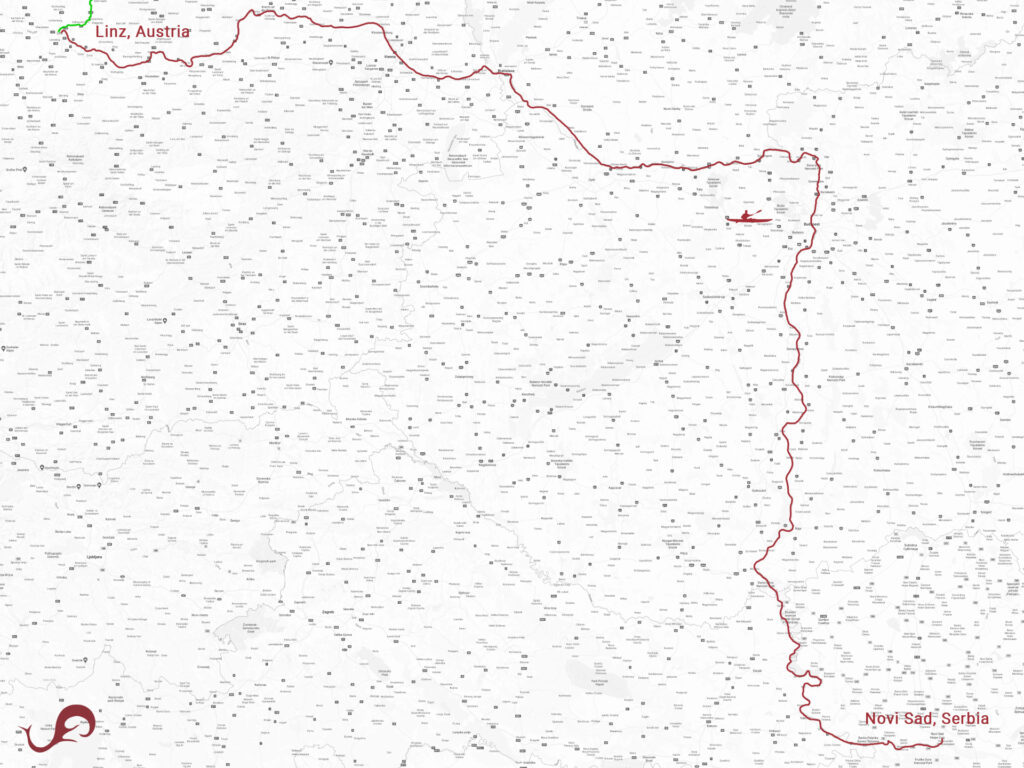PART TWO: THE REST OF THE STORYPART TWO: THE REST OF THE STORY
CHAPTER EIGHT
GETTING A BIT OF FROSTBITE
The dome of the Esztergom Cathedral was no longer green; it was white. When I left Prague, everything was white—the scenery was covered with a meter of snow, the tree branches were white and gently curved down in respect to Mother Earth.
Only the Danube was snowless. Thankfully.
On the radio they said that Hungary was experiencing the worst snowstorm in 40 years. I glided past Budapest and allowed the kayak to be spun round and round in the river’s weak current.
I gazed upon the castle, theater, and churches embedded in the winter landscape. This was what I had hoped for when I reached Prague: to slip in through the center of town.
It was beautiful. I took a few pictures to remind me of this moment, but I didn’t step ashore.
Now I wanted to go further, to travel some more before I stopped. The snow had finally stopped falling, but it still remained on the hills. I longed for the absence of snow and above-freezing temperatures.
The only advantage of snow was that it was easy to pull my heavy kayak along when I needed to camp. I walked up to an area where I could move without getting too wet and snowy. This was like looking for a camp when you were out skiing in northern Sweden.
While it was fortunate that the habit was ingrained in me, I had inferior equipment this time. The situation was a little tougher, so I ended up getting frostbite on my soles and toes.
Lost in Translation
I had reached a small village; time for a pit stop. I went ashore to fill up my water container and to look for a shop where I could buy food.
A few meters away, an old man with a hat made of sheepskin on his head and an ax in his right hand was looking right at me. I shouted from the edge of the water: “Essen! Mercado? Pasta? Kolbász?” I provided visual clues with each word, hoping that sign language was indeed universal. The latter was Hungarian for smoked sausage and I really wouldn’t mind to have some right now.
Apparently, I had a potential career as a mime. He seemed to understand and, if I understood him right, there was a store close by.
The man calmly waited for me while I pulled up my kayak. I secured it before I climbed up the steep riverbank to meet him. After shaking hands, I tried to explain to him which country I came from: “Svéd, English, Englisch, Skandináv.” He gave me an uncomprehending look.
Saying the Magic Word
So I cut to the chase. “Viking,” I declared, and used my index fingers to demonstrate two devil’s horns.
His face lit up and he joyfully exclaimed, “Viking!” He made a sweeping motion with his ax as if to reinforce that it was THE Viking he was referring to.
It was strange that even if I told people where I came from, saying my country’s name correctly and in the right language, it didn’t get me anywhere. On the other hand, the Vikings were recognized everywhere, from Hungary to South America and Africa. It seemed that my ancestors had been very busy.
The little axe-wielding man became my proud guide through the village, shouting to each neighbor and villager whom he met. “A Viking, by kayak!” We must have looked a funny pair—there he was, walking quickly through the streets in his warm boots, while I was jumping around like a hare in order to get the blood circulating in my cold feet that were clad in thin neoprene boots for diving.


